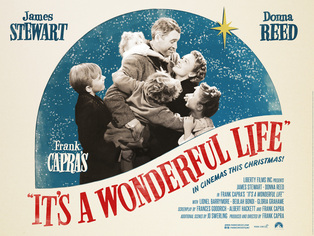
There’s a tradition where I come from. Every year, many brave the bitter winter chill and the odd burst of snow to seek refuge in the warm glow of their local cinema. It’s always packed, every seat taken, filled with people who have gathered together to experience something. Huddled in a room of mostly strangers, all those present are there for the communal catharsis that comes with this event. And with this, there is the unspoken, but well understood agreement amongst participants that the emotional effect of what they will feel within these walls shall be met with full acceptance and no judgement. There is an amnesty on castigation here. Tears are allowed, even expected, in this room. In a time that some call overly cynical, too knowing and ironic for people to be able to feel things sincerely, here and now is evidence against that. These people are here to feel. They’re all here to see It’s a Wonderful Life.
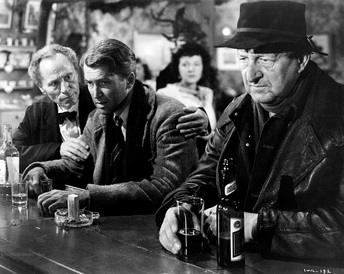
It’s because this film gives you something very special for Christmas. This film will give you hope...
... but it won’t half make you work for it. In fact, it’ll put you through absolute hell first.
Frank Capra was a film-maker who understood, perhaps better than anyone of his time, that the best way to make people feel good was to make them feel horrible first. The art of emotional manipulation through storytelling means that to end on something as affirming as hope, particularly to the dizzying heights of It's a Wonderful Life, one must first, paradoxically, feel despair. Despair comes when hope appears to be lost, when a future is no longer visible on the horizon, and when all that exists is the prospect of a persistent, never-ending gloom. Despair is the tunnel... but hope is the light at the end of it. If you have that, it gives you direction, purpose, drive. And the thing about hope is that there doesn't necessarily need to be anything concrete behind it to work. Hope is just the kind of thing that the mere existence of it is enough to carry someone through. That little glimmer can be the thing that sees you into the next day.
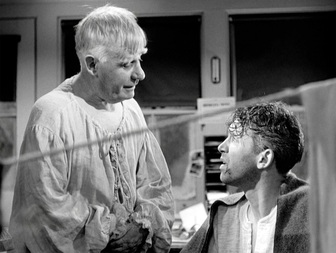
Financial worries are familiar to all, particularly at this time of year, and George Bailey knows this more than most. As the reluctant manager of his father's building and loan, he understands that people need help to get what they need all year round, be that the need for a home or starting a family. He keeps up the business because it was his father's legacy, and to let it die would mean not only letting down his own family, but leaving the people of Bedford Falls to the whims of old man Potter (a wonderfully cruel Lionel Barrymore), whose grip on the small town threatens to crush it forever. It's as painful as it is heartening, knowing all we do about George. We know that he begrudgingly denies his own dreams of a college education and world travel to stay where he is and help everyone else. And the more he does it, the more we want him to do something for himself, to have some kind of happiness of his own.
Thank goodness for the positively luminous Donna Reed, here as George's wife Mary. Besotted with George since they were children, she is the one genuine spark of light in his life, and the family they have together becomes George's reason to go on, even though they can equally act as another chain on his own dreams. The pressure on George to provide for his family, his friends, customers, the whole town, is as clear anything in the film. There is no mistaking that with each new turn, there is a fresh struggle to contend with.
Make no mistake, the darkness of It's a Wonderful Life is palpable. Death, poverty, heartbreak and suicide are all there to be seen. There are times where it seems to be a never-ending onslaught of misfortune and woe, and we can feel along with George that crushing sense of the walls coming down. It walks our hero to the absolute brink of what he can take, to the point where he finds himself standing on a bridge and stares down into his own doom, contemplating the worst in an effort to release himself from his anguish and give one last thing to his family. At this moment, George is literally moments from his end.
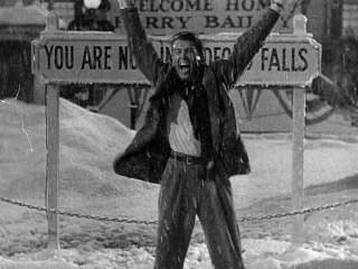
The film's point is made abundantly clear: one person can make a difference. Without you (yes, you), the lives of those around you would in no way be the same. Someone who tries to live as well as they can, and help as many as they can, is perhaps the most important thing there is.
In this light, it's perhaps interesting to note that the film was something of moderate failure at the box office upon first release, though it was nominated for five Oscars. However, thanks to repeated screenings on TV around Christmastime, the film was able to find the audience it deserved. It became a seasonal favourite, and one that would come to draw audiences far and wide to fill the cinema seats and experience that which the film always hoped to give people. The story of how It's a Wonderful Life came to become the classic that it is oddly parallels the emotional trajectory of the its own narrative.
And, because I haven't mentioned her yet, I love Gloria Grahame, and so should you.
Earlier this year, not too long ago in fact, the movie world had a moment when almost everyone collectively shuddered. This was the precursor to a major, though short-lived outcry against the news that Star Partners and Hummingbird Productions were planning to make a sequel to It's a Wonderful Life. Producers Allen J. Schwalb (of Star Partners) and Bob Farnsworth (of Hummingbird) were set to work up It's a Wonderful Life: The Rest of the Story, based on a script co-written by Farnsworth and Martha Bolton, for a 2016 release. Though all involved were quick to state that this film would indeed hold to the spirit of the original (they even recruited the original's own Zuzu, Karolyn Grimes, to participate) this new tale of that Bailey Christmas spirit automatically felt like something different. In short, the proposed sequel was to follow the story of another George Bailey, grandson of Jimmy Stewart's George, a miserable swine who people loathed. Flipping the conceit of the original film, this new George would be visited by an angel and shown that the world would actually have been better without him in it, thus making him change his ways.
Yeah, they basically took It's a Wonderful Life and A Christmas Carol and smashed them together for a festive buck. If they could also somehow have set it in Nakatomi Plaza, then they would have hit the Christmas classic trifecta. (Neither is it a particularly original twist, since at the very least, Stephen Fry and Hugh Laurie did a parody skit along same lines about Rupert Murdoch).
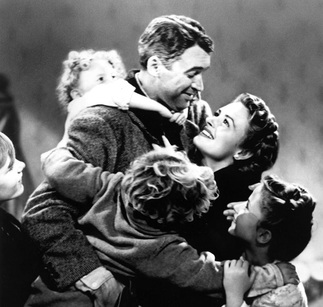
Fortunately for us all, Paramount did the thing everyone hoped they'd do, stepped in and stopped this new film in its tracks. Sure, it amounted to nothing more than pointing out that they had the copyright and would not allow any film to go ahead that had not dealt with them first, but it did the job. Ironically, what could be perceived as a Potter-like action actually saved George Bailey.
There are any number of reasons as to why films endure and become classics. Some of them because of their incredible artistic merit… some of them because they encapsulate the time and place so well that to watch them is like going back in time… some of them simply because of a particular point of notoriety. However, perhaps more than anything, it's because these are the films that translate something to the audience, a feeling worth sharing and being enraptured by as a communal experience. These are the ones that make us feel the hardest, the most profoundly.
And what It's a Wonderful Life makes us feel is joy... elation... hope.
Follow Paul on Twitter!

 RSS Feed
RSS Feed
